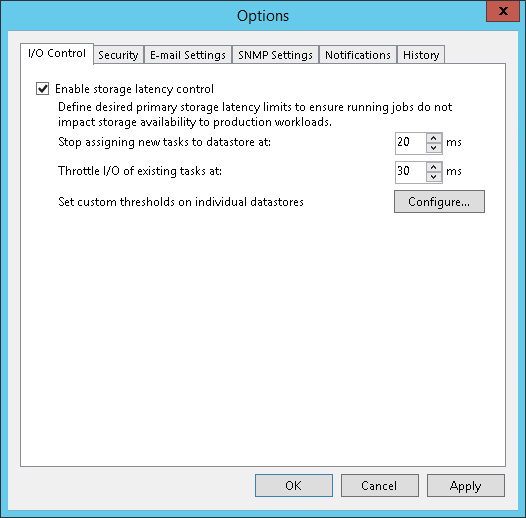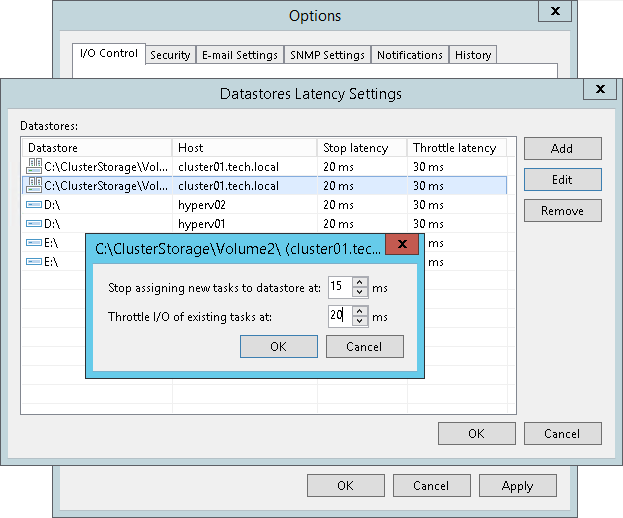指定 I/O 设置
You can specify data processing settings.
Mind the following:
- The Enable storage latency control option is included in the Veeam Universal License. When using a legacy socket-based license, Enterprise or higher edition is required.
- The Set custom thresholds on individual datastores option is included in the Veeam Universal License. When using a legacy socket-based license, Enterprise Plus edition is required.
To specify data processing settings:
- From the main menu, select General Options.
- Click the I/O Control tab.
- To control the I/O load on the production storage where VMs reside, select the Enable storage latency control check box. When you enable storage latency control, Veeam Backup & Replication monitors storage read latency on production volumes during data protection and disaster recovery activities. To monitor the storage latency, Veeam Backup & Replication uses real-time metrics from the hypervisor where VMs reside. Metrics from the hypervisor are collected every 10 seconds.
Specify two thresholds:
- In the Stop assigning new tasks to datastore at field, specify the I/O latency limit at which Veeam Backup & Replication must not assign new tasks targeted at the volume.
- In the Throttle I/O of existing tasks at field, specify the I/O latency limit at which Veeam Backup & Replication must decrease the speed of data retrieval or writing to/from the volume. When the I/O latency for this volume reaches this value, the Veeam Data Mover working with this volume will slow down data retrieval or writing.
The value in the Stop assigning new tasks to datastore at field cannot be greater than the value in the Throttle I/O of existing tasks at field.
Note |
If you enable the storage latency control option, Veeam Backup & Replication starts processing VM disks residing on the same datastore with a 40-60 second time offset. This offset helps Veeam Backup & Replication evaluate the current I/O load on the datastore. For example, if you launch a job processing a VM with two disks, Veeam Backup & Replication will start processing the first VM disk, wait for 40-60 seconds to evaluate the I/O workload on the datastore, and then start processing the second VM disk. Keep in mind this behavior. If you schedule jobs that process multiple VM disks residing on the same datastore to start at the same time, the jobs performance will degrade. |

You can set the I/O latency limit for every storage in the virtual infrastructure separately.
To set the I/O latency limit for every storage separately:
- From the main menu, select General Options.
- Click the I/O Control tab.
- Click Configure.
- Click Add > Volume, select the necessary volume and click OK to add it to the storage list.
- Select the added volumes in the list and click Edit.
- Specify the I/O thresholds for the volumes as described above.
